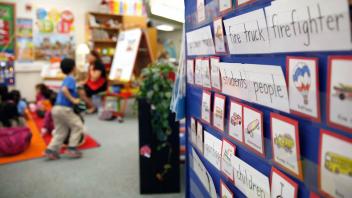Children also learn words through lessons that focus on the meanings of words and how the words are used in written materials. When children write stories, they often use their new words.
Here are some things to try at home:
- Select many kinds of books, stories, and other printed material to read to your children. Also, help them choose different types of books and stories to read on their own.
- Talk with your children about daily events, about events that have happened in the past, and about plans for the future. Every once in a while, use a “hard” word and discuss the meaning of that word.
- Have your children keep a list of new words they have learned. Ask them to listen for new words as people talk. Have your children find new words in newspapers, books, catalogs, and magazines. Discuss the meanings of the new words with your children and have them add these words to their list.
- Give your children a word that is found in other words (for example, grow is found in growing and growth). Ask them to name other words that are related. You can call this group of words a “word family.” Have your children make a book of word families by writing words from the same family on a page and by drawing pictures about the words. Clip or staple together several pages of word families and pictures to form a book.
- After talking about a new word and its meaning, ask your children to write their own sentences using the word.
Citation
Adapted from: Beginning Reading Instruction: Practical Ideas for Parents. (1996). Texas Education Agency.
